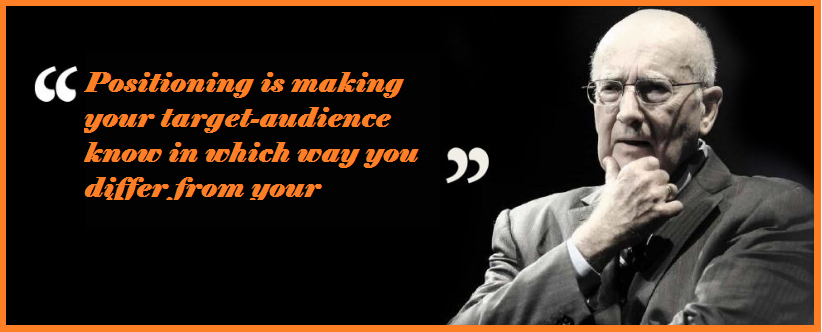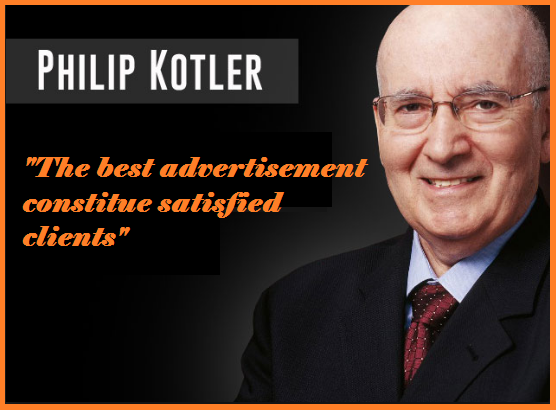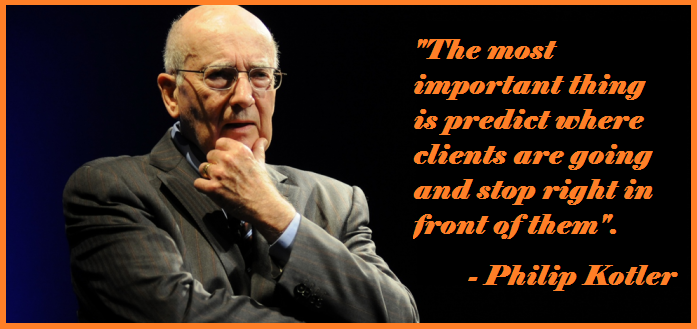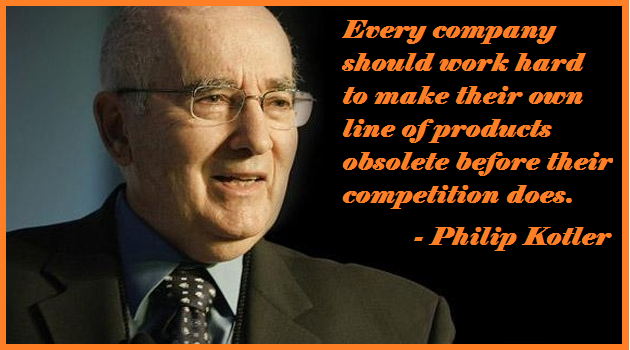To obtain the best results from marketing techniques and apply them to your online positioning strategy there’s nothing better than reviewing concepts and studying the most prominent authors of that area.
It’s no doubt that Philip Kotler is one of them! He is considered the “Father of Modern Marketing”, and provides us with important lessons that can be applied to your digital strategy.
Before anything else, it’s essential that you understand what relevance Philip Kotler holds in Marketing as we know it today.
Who is Philip Kotler?
To sum it up, this great North American Professor is the creator of Marketing as a field of academic study.
It’s quite so! Thanks to Philip Kotler universities all around the world now include Marketing in their academic programs. Born in Chicago, Illinois, this renowned author has been the International Marketing chair holder at Northwestern University since 1988, one of the most important business centers of study in the world.
Below you can see some key information on this Modern Marketing Figure:
Principle Marketing concepts explained by Philip Kotler
As we said much earlier, to get the most out of Marketing and bring some real advantages to your business there’s nothing better than reviewing the principle concepts from the mind of the most renowned scholar in the world:
Marketing Definition Kotler: What is Marketing?
As Philip Kotler explains in his book Marketing Management, “Marketing is an administrative and social process through which individuals and groups obtain what they need and desire by the generation, offering and exchange of valuable products with their equals”.
What is Segmentation?
For Kotler and Armstrong, the authors of Principles of Marketing, segmentation is acknowledging that you can’t serve all clients with the same level of satisfaction. This way, in order to provide the greatest satisfaction possible, it’s necessary to define a “Target Market”.
So, a Target Market “consists of a set of buyers who have common needs and/or characteristics to those that the company or organization decides to serve”. And this precisely points to advertising on Facebook, which offers detailed segmentation through personalized announcements.
What is Positioning?
According to Philip Kotler, Positioning is making your target audience know exactly how you differ from your competitors. “For example, in Starbucks case, you will see that not only do they ensure that the coffee is fresh and that the product has what it takes, but also that they add so much more”.
So, as the author points out with the Starbucks example, “Their position is giving a better coffee, more varieties to choose from and a completely pleasant experience in a place where you’ll enjoy having a coffee”.
What is Marketing 1.0?
In an interesting interview (you can find the video further below) Philip Kotler explains that there are 3 types of Marketing, which he defines himself in his book Marketing 3.0 From Products to Customers to the Human Spirit. The first of these is Marketing 1.0, which is the one that the majority companies currently work in.
“Marketing 1.0 is noted for reaching clients’ minds”, explains Kotler. “1.0 companies do a good job, offer good quality products to people and generate earnings”.
However, as we’ll see below, there also exists many “evolved” ways to execute Marketing.
What is Marketing 2.0?
As Kotler explains in the aforementioned interview, “Some companies decide to learn more about to who they are selling their products, set out to fabricate and sell quality goods,to understand their clients through the study of large databases and to offer them a differential service”.
This way, thanks to new digital analytical tools that spew out statistics,
companies can define and analyze their client databases in order to know them better. And he concludes “Through these they study consumer behaviors and preferences in order to give them the best service possible.”
What is Marketing 3.0?
Lastly, Philip Kotler presents the most advanced form of Marketing, Marketing 3.0: “Only a few companies work in this instance. At this stage, it comes down to understanding that getting to know the client is much more than finding a person interested in your product”.
As the author explains, “It’s understanding that people are in an unstable world with economic and ecological problems which should be remedied”.
The companies dedicated to Marketing 3.0 operate on this unstable and problematic context with the goal of showing that they are interested in improving the situation.
Thereby, Marketing 3.0 doesn’t only aim to sell products in the best way possible but to also to make the world a better place. Marketing 3.0 is providing: product, service and value.
Finally, the author explains that the majority of current companies that are in Marketing 1.0 and it’s recommended for these companies who want to advance in their methodology that they don’t jump directly to 3.0 but rather go step by step and include the 2.0 stage in their “evolution” process”.
Now that you know who Philip Kotler is and know his principle concepts, I’m sharing 27 of his most educative and enlightening quotes with you so you keep them in mind when thinking about your own social media and digital marketing strategies.
1- “You should never go to the battlefield before having won the war on paper. The good news is that you can learn Marketing in an hour. The bad news, it takes a lifetime to perfect it”.
2- “Marketing is not the art of finding ingenuous ways to exhibit what you do. Marketing is the art of creating genuine value before your clients and helping them to improve. The keywords of Marketing are “Quality”, “Service” and “Value”.
3- “Every business is a service business. You’re not a chemical company. You’re a company of chemical services.
Does your service presentation make your clients smile?
4- “The sales department is not the entire company, but the entire company should be the sales department”.
5- “The best advertisement constitute satisfied clients”.
6- “Companies pay too much attention to the cost of something. They should be more worried about the cost of doing nothing”.
7- “Successful sellers are concerned with the client first and the products later”.
8- “Good companies will satisfy needs;
excellent companies will create markets”.
9- “The best form of retaining clients is to constantly analyze how to give them more for less”.
10- “It’s more important to do what is strategically correct than what is immediately profitable”.
11- “There is only one winning strategy: it is cautiously defining a target market and pushing a superior offer towards this market”.
12- “The most important thing is predict where clients are going and stop right in front of them”.
13- “Poor companies ignore their competitors, average companies imitate their competitors and winning companies lead their competitors”.
14- “During the past 60 years, marketing focused itself on the product (Marketing 1.0) centered itself on the consumer (Marketing 2.0). Now we’re seeing how Marketing is being transformed once more in response to the new dynamics of the environment”.
“We observe companies that increase their focus from products to consumers and then towards the problems of humanity. Marketing 3.0 is the stage in which companies evolve from focusing on the consumers to focusing on humanity and where the earnings are balanced with corporate responsibility”.
15- “Marketing is a race without a finish line”.16- “Now days you have to run much faster to stay in the same spot”.
17- “The intelligent marketers of today don’t sell products, they sell benefits packets. Not only do they sell purchase value but also usage value”.
18- “The key to branding (Brand-building), especially for small companies, is to focus on a limit number of areas in the sector and develop a superior expertise in said areas”.
19- “The future is not ahead of us. It has already happened”.
20- “Every company should work hard to make their own line of products obsolete before their competition does”.
21- “Don’t buy market actions. Discover how to earn them”.
22- “The Internet will make the winners bury the stragglers”.
23- “Marketing is the collection of human activities aimed at facilitating and consummating exchanges”.
24- “Marketing is the task we perform before creating a product. If three years is spent developing a product, then it won’t be the correct product”.
25- “Market analysis is the evolution of trying to maximize the company’s earnings for each transaction, to maximize the earnings of each relationship in the long term”.
26- “The cost is not important for establishing the Price. It only serves for knowing if you should or shouldn’t fabricate the product”.
27- “The future of Marketing resides in marketing databases, through which we know enough about each client to make relevant and personalized offers to each one of them”.





No comments:
Post a Comment
All the postings of mine in this whole forum can be the same with anyone in the world of the internet. Am just doing a favor for our forum users to avoid searching everywhere. I am trying to give all interesting informations about Finance, Culture, Herbals, Ayurveda, phycology, Sales, Marketing, Communication, Mythology, Quotations, etc. Plz mail me your requirement - amit.knp@rediffmail.com